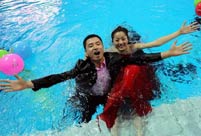It is commonplace to refer to China’s enormous strides of the past decades as an “economic miracle.” Yet in essence a miracle is an event beyond human performance or comprehension. China’s reform and development was a policy course adopted by top officials and carried out through the efforts and vitality of the Chinese people. Even if the feats this course involved could not easily be duplicated, they can be studied and mined for practical lessons within China and beyond.
With Zhu Rongji on the Record, China’s former Premier Zhu Rongji has made a valuable contribution to this process. He has collected dozens of speeches, dialogues, and internal memoranda reflecting his engagement with the major economic, political, and social issues of his era. They cover a period when China, under the leadership of President Jiang Zemin and with Zhu as Vice Premier and subsequently Premier, overhauled its financial system, tamed escalating inflation, concluded arduous negotiations on its entry into the World Trade Organization, lifted tens of millions out of poverty, launched an ambitious development program for its western regions, joined the ranks of the world’s largest economies, and made a successful bid for the 2008 Olympics.
By any standard, it was a period of momentous change. It was particularly noteworthy for witnessing the construction of a new set of links between China and the international system—in trade, financial markets, science and education, diplomacy, and many other fields. In its depth and breadth, this integration of China into international architecture had no precedent in previous eras of Chinese history. What Jiang, Zhu, and their colleagues oversaw reflected their considered judgment about China’s interests and necessities. The implications were global. The elaboration of the links they fostered will form an essential, perhaps decisive, component of 21st-century world order.
Given this record of extraordinary achievement, one might expect to find in these pages a record of triumphs and exultation. What Zhu provides is something more complex, more sober, and ultimately bolder. He has been as direct in his editorial selections as he was in his leadership style in office and has not shied away from difficult or sensitive issues. The challenges of balancing growth with environmental preservation; the pitfalls of domestic and international financial instability; the daunting endeavor of reforming China’s stock exchanges, labor regulations, infrastructure programs, and grain and natural-resources markets; the urgent task of uprooting malfeasance and preventing financial abuses; the complexities of encouraging growth while ensuring quality and consistency—readers will find forthright discussions of all of these issues in Zhu’s book. The picture that emerges is one of the immensity of the task of governing China and addressing its contemporary challenges—and of the boldness and creativity of the generation charged with turning Deng Xiaoping’s reform-and-opening-up concept into a reality.
 |
 Fire guts 22-storey Nigeria commercial building in Lagos
Fire guts 22-storey Nigeria commercial building in Lagos U.S. Navy Carrier Strike Group stages military exercises
U.S. Navy Carrier Strike Group stages military exercises Volkswagen showcases new energy vehicles in Beijing
Volkswagen showcases new energy vehicles in Beijing  How should we get married nowadays?
How should we get married nowadays?  Commentary:
Commentary: Jakie Chan sees Rubber Duck off in Beijing
Jakie Chan sees Rubber Duck off in Beijing Hello! Horror Halloween Celebration!
Hello! Horror Halloween Celebration!  The catwalk to the world of fashion
The catwalk to the world of fashion  Cruise trip to Taiwan
Cruise trip to Taiwan  Unveil PLA air force base
Unveil PLA air force base  Say goodbye to tube-like apartment building
Say goodbye to tube-like apartment building Oriental education or western education?
Oriental education or western education? China in autumn: Kingdom of red and golden
China in autumn: Kingdom of red and golden National Geographic Traveler Photo Contest
National Geographic Traveler Photo Contest Chinese screen goddesses from Beijing Film Academy
Chinese screen goddesses from Beijing Film Academy Day|Week|Month